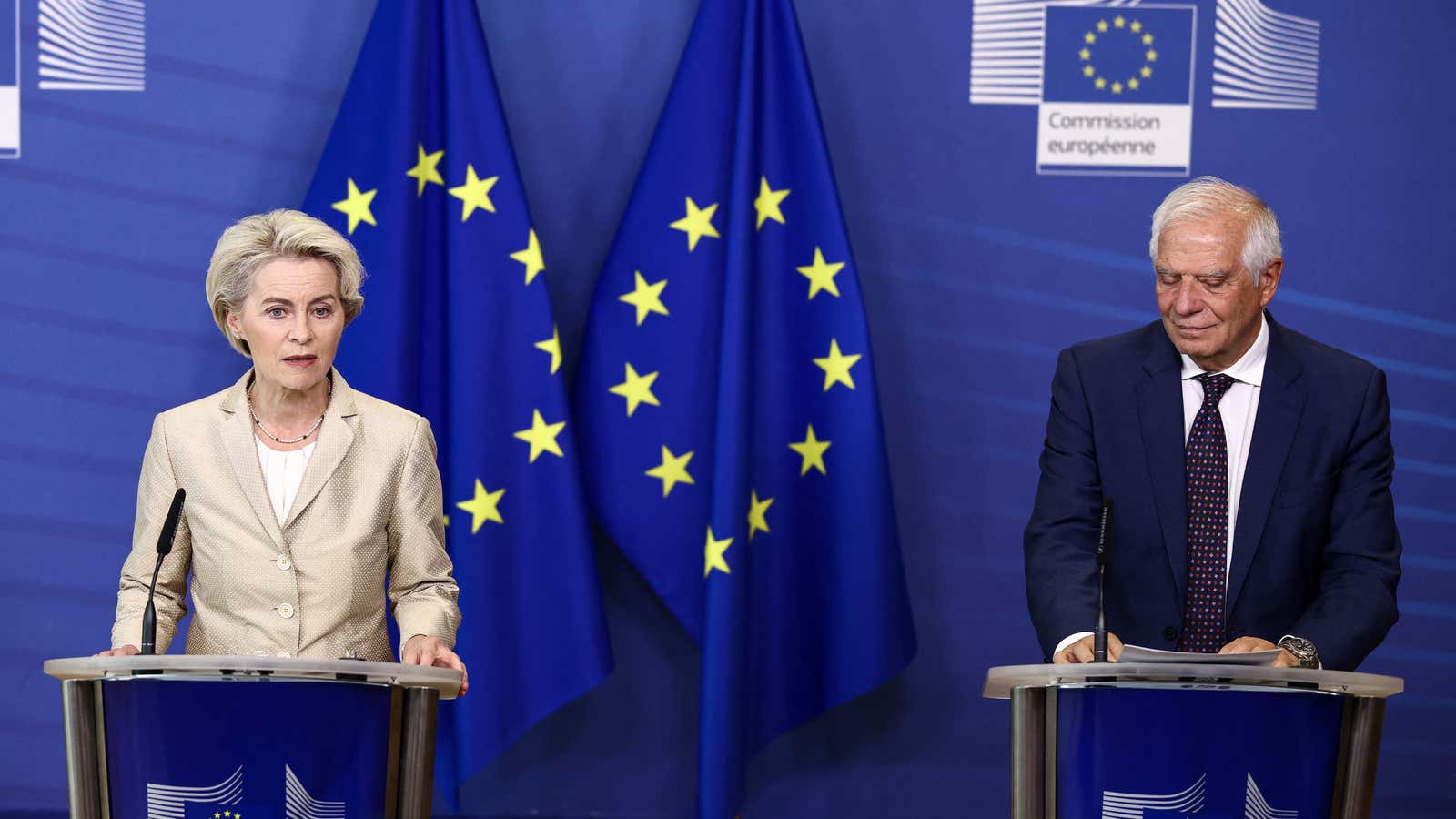Good morning, Quartz readers!
Here’s what you need to know
The EU tentatively agreed on a $60 Russian oil price cap. The rate will be adjusted as-needed to keep the cap 5% below market price, Reuters reports. All 27 members of the bloc will need to approve the measure.
Beijing eased covid restrictions. The capital will allow covid-positive residents in one district to quarantine at home, rather than at a government site as was previously mandated. More rules in China are expected to be relaxed in the near future, following nationwide protests.
French doctors went on a nationwide strike. General practitioners and lab workers have staged a historic, two-day walkout that continues today (Dec. 2) as they seek better pay and conditions. In the UK, over 10,000 ambulance workers have agreed to go on strike in December.
Sam Bankman-Fried made his first public appearance since FTX collapsed. The founder and former CEO of the fallen crypto exchange said in a virtual interview: “I didn’t try to commit fraud.”
Heineken ended a nearly four-decade partnership with Kirin. The Dutch brewer is striking out on its own in the Japanese market, and announced plans to raise prices to offset increasing costs.
Japan began its electricity-saving period. The government has asked people to dress warmly and set at-home heating to low. France has also announced a power-saving strategy amid the global energy crisis.
What to watch for
The US Bureau of Labor Statistics releases jobs numbers today. Economists polled by Dow Jones expect the US to add 200,000 jobs. If this turns out to be accurate, it will be a much slower pace of growth from the 261,000 jobs the US added in October.
There’s a good chance the economists are right. Another BLS report released earlier in the week showed US job openings declined by 353,000 in October, while the percentage of workers quitting edged down from 2.7% to 2.6%. A jobs indicator released by payroll firm ADP showed a measly 127,000 jobs added in November, hampered by a shortfall of 100,000 manufacturing jobs.
But maybe we should be paying more attention to the jobs report’s earnings data: The Federal Reserve is more likely to hike rates to a level that raises unemployment if earnings remain high.
For sale: 100 islands, never developed
What would you do with 100 Indonesian islands that are home to irreplaceable biodiversity?
Whoever wins a Sotheby’s auction that’s selling the development rights to the islands, described by the broker as “one of the most intact coral atoll ecosystems left on Earth,” will get to answer that question. How they do will undoubtedly have big environmental consequences.
At a time when billionaires like Amazon’s Jeff Bezos are queuing up to give away their fortunes, and when their efforts are more discredited than ever, it’d make a lot of sense, and would be a little redeeming, if one of the super-rich bought these development rights—and then left the islands alone.
Is it ideal for a rich Western individual to buy and hold such biodiversity treasures? Certainly not. But the alternative, selling them to be developed for profit, holds no promise of solving the world’s environmental problems, or even the specific issues faced by Indonesia.
Immigrants didn’t just build the World Cup—they’re playing in it
In Qatar, immigrant labor has built the stadiums and infrastructure needed to host the ongoing $200 billion FIFA World Cup. And it has come with a devastating human toll: between 400 and 500 worker deaths have been reported in Qatar so far, and that’s likely an undercount.
But beyond the construction labor, immigrants have also taken to the field in cleats, playing in the World Cup itself. Nearly 17% of players this year are representing countries they weren’t born in, a number that signals an altogether different kind of globalized workforce.
✦ The next Weekend Brief will look at the immigrant compositions of teams, and how shifting demographics are changing up the World Cup. The Weekend Brief is a member exclusive email, so you’ll need to sign up for a Quartz membership today—but we’ve scored you a 50% off deal.
Quartz’s most popular
🚪 With Bret Taylor’s exit, Marc Benioff is once again the sole CEO of Salesforce
👋 How to remove Iran from the UN Commission on the Status of Women
🥵 Heating costs are rising fast in the northeast US as winter looms
🔍 Decoding the signs and symbols of the US-Iran World Cup game
🦷 How the US Congress could defang OPEC and keep gas prices low in one stroke
👎 Elon Musk is a bad spokesman for a good fight against app store monopolies
Surprising discoveries
PhD programs are having a “GRExit” moment. Schools have opted to ditch the standard Graduate Record Examination test after questioning its fairness and validity.
France’s baguette and Tunisia’s harissa were granted Unesco status. The two cultural heritage foods actually sound like a pretty good combo.
Humongous and tiny numbers got new prefixes. The International System of Units has added ronna, ronto, quetta, and quecto to the lexicon.
Key changes are no longer trendy in pop. The only scale-shifting hit we’ve heard in recent years is “Sicko Mode.”
Physicists sent messages through a mini wormhole. U up? It’s the spacetime continuum, but some just call me a hologram.
1️⃣ More Thing
Before you go—we’ve got a chance for you to win a $250 Amazon gift card. Tell us why you read Quartz and you’ll be entered to win.
Our best wishes for a productive day. Send any news, comments, fresh bread, and karaoke classics to hi@qz.com. Reader support makes Quartz available to all—become a member. Today’s Daily Brief was brought to you by Cassie Werber, Sofia Lotto Persio, Julia Malleck, Nate DiCamillo, and Morgan Haefner.
Correction: Yesterday’s Daily Brief (Dec. 1) referred to Gautam Adani as the world’s second richest person, but according to real time estimates he is currently the third richest.
